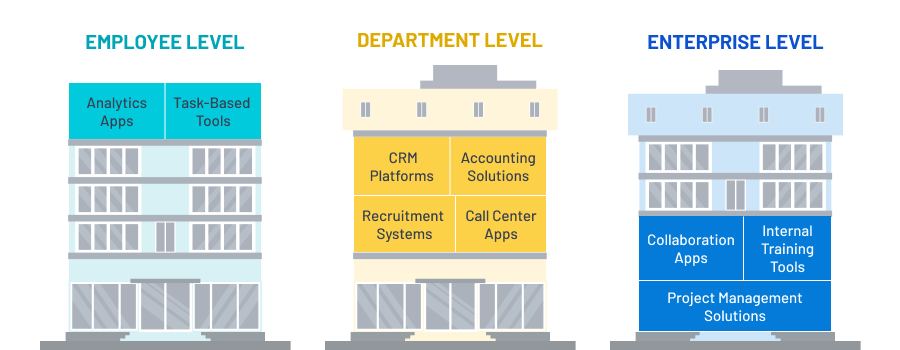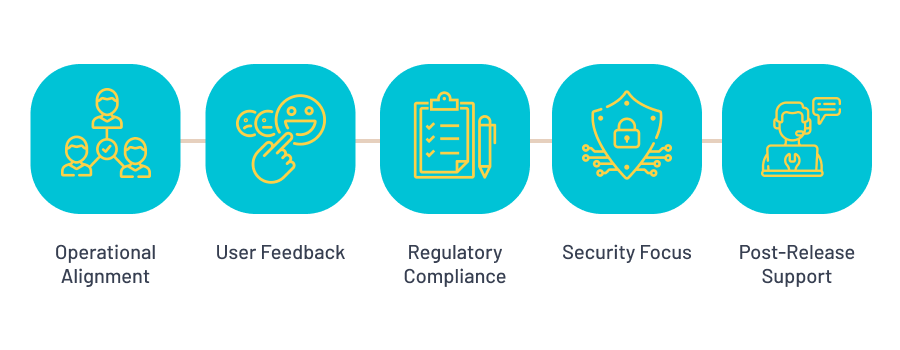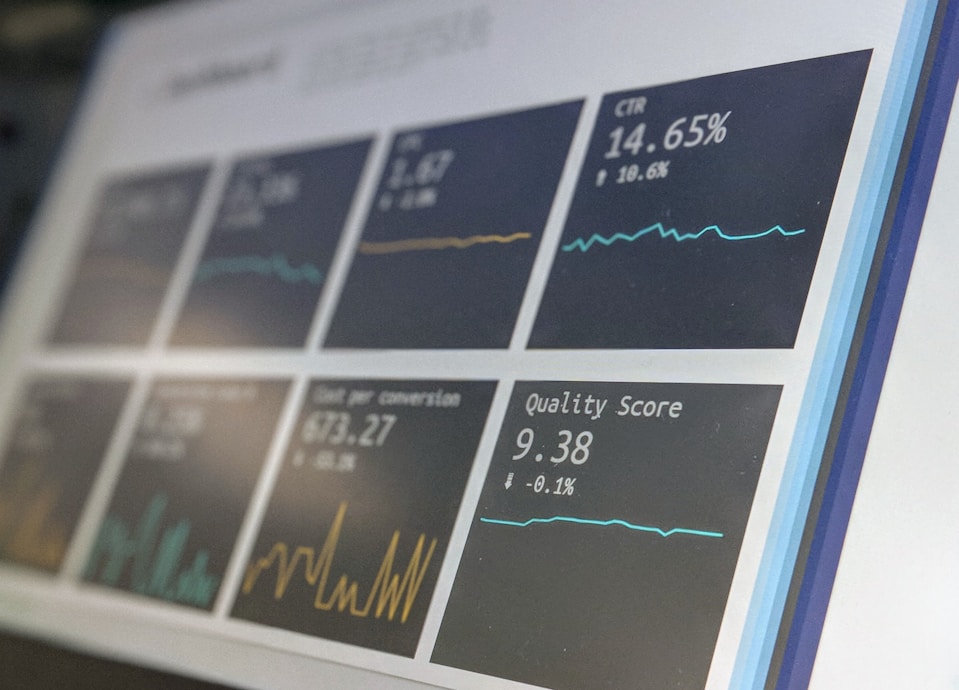Large organizations have quite vast and complex daily operations that require oversight. There are various enterprise systems in place that all have to work together to ensure the company keeps running and moving forward.
Combine this with the “always on” nature of the modern world, and it becomes easy to see why so many companies are pursuing enterprise mobile app development. After all, if you can acquire a solution to help manage various aspects of the business on-the-go, it can result in a substantial efficiency boost.
Yet, it might be hard to determine where to start when it comes to building mobile apps for the enterprise. So, in today’s post, we’ll dive into the subject and discuss:
- Why build mobile enterprise applications
- Types of apps to develop
- Top considerations to remember
- Main trends affecting enterprise apps
Ready to get into it? Let’s start.
Why Develop Enterprise Mobile Apps?

First, let’s get the definitions out of the way. As the name suggests, enterprise apps are developed for companies and their employees, including those in the maritime industry, to help operations run smoothly, optimize processes, and automate workflows. Hence, they are distinct from consumer applications which are built for individual users and often serve as direct revenue-generating products for the business.
Enterprise apps might include CRM platforms, ERP systems, contact centers, and the like. On the other hand, consumer-facing solutions are things like food delivery apps, social media tools, dating apps, and so on. We think you get the gist.
Learn more about the Differences Between Consumer and Enterprise Apps
So, why would a company be interested in enterprise mobile app development? Well, there are several reasons, including:
- Access internal platforms on-the-go
- Maintain data accuracy across systems
- Eliminate paperwork and/or copy-pasting activities
- Manage employees remotely
- Boost efficiencies
Of course, the benefits will also depend on the type of enterprise app you choose to implement. So, you might actually observe even more advantages following the deployment of your solution.
Enterprise Mobile App Types

Now that we’ve established some clarity on the purpose of mobile apps for enterprises, it’s time to take a closer look at the different kinds of solutions that are out there. Of course, there are tens of enterprise tools you might consider implementing, however, they will typically fit into either one of three distinct categories or “levels” — employee, department, and enterprise.
Employee Level
Employee-level enterprise apps are focused on helping your staff carry out their job-related tasks or solving specific issues. For example, an application where graphic designers can create their sketches can be considered employee-level.
Additionally, business intelligence tools and other analytical solutions would also fall into this category as they help managers, data analysts, and other employees keep track of KPIs and measure success of concrete initiatives.
Department Level
Department-level apps are a step further and, as the name suggests, are developed to cater to the needs of a particular department. Hence, they usually have more features and capabilities than employee-level apps as they have to facilitate the work of an entire team.
Some typical examples of department level apps include marketing campaign management tools, CRM systems, financial accounting software, recruitment process tracking platforms, call center applications, and more.
Discover how we developed Sales and Marketing Automation Solutions for Insurance
Typically, these enterprise mobile apps will focus on optimizing workflows across the team, facilitating collaboration, and carrying out department-wide projects on-the-go.
Enterprise Level
Lastly, enterprise-level applications are those that are used by the entire organization. They foster collaboration, communication, education, and generally help organize company work.
So, enterprise-level apps typically include project management tools, corporate training platforms, databases, communication software, and the like. Jira issue tracking system and Microsoft Teams messenger can both be considered enterprise level apps.
Choosing a Winning App Development Strategy
Watch our webinar to uncover effective mobile development approaches and launch your app.
Key Considerations in Enterprise Mobile App Development

You now know the various applications that companies tend to rely on and might be curious about the intricacies of the implementation process. The truth is, the enterprise mobile app development process will look very similar to that of other mobile solutions. However, there are a few enterprise-specific things that are imperative to consider. That’s what we’ll talk about below.
Skim through the Steps of the Mobile App Development Process
Operational Alignment
First and foremost, no matter the type of enterprise app you choose to develop, you’ve got to ensure operational alignment. What do we mean by this?
In essence, you just have to outline your goals for the app and ideally discuss them with department managers and get their input as well as potentially that of employees. You want everyone to be clear on why a new solution is being implemented, the importance of it, and so on.
Besides this cultural part, it is also valuable to consider how the application might align the processes of various departments and discuss this with the development team. For instance, it might be worth integrating systems like CRMs with accounting from the get-go to facilitate seamless work and collaboration.
Read about our CRM Integration with QuickBooks Project
User Feedback Incorporation
Another crucial point to consider when embarking on enterprise mobile app development is the incorporation of user feedback. Ideally, you want the end-users, also known as your employees, to be involved in the creation process from the very beginning. After all, that’s the only way to ensure the final app actually ends up being used by them and is a success.
So, speak to your staff and get an idea of their needs and challenges to figure out how the mobile app can cater to them. Then, once the first iterations of the solution are ready, let them test it out and collect feedback. That way, you’ll significantly increase the chances of high user adoption levels when the final tool is ready.
User-Driven Approach
Watch our webinar and learn the top ways of reducing poor user satisfaction, low adoption rates, and decreased loyalty.
Regulatory Compliance
Depending on the industry you operate in, it’s an absolute must to consider regulatory compliance prior to starting enterprise app development.
Business sectors like healthcare, finance, and the like, tend to have very strict rules when it comes to data storage and processing. For instance, in the medical field, adhering to HIPAA regulations is non-negotiable if you want patients to trust you, avoid enormous fines, and generally play by the industry rules.
Read about HIPAA-Compliant App Development
So, don’t forget to discuss regulatory compliance with your software development partner and make sure that the mobile app adheres to all relevant guidelines.
Security Focus
On a similar note, you must also keep in mind the security of your enterprise mobile application. Not only to stay in line with industry regulations but also to avoid falling victim to cyberattacks that can lead to huge reputational and financial losses.
You see, when you’re developing an enterprise mobile app, you’re basically adding new endpoints to your corporate network that could become infected via the devices it is installed on. Given that attacks via endpoints are quite popular, especially in industries like healthcare, you definitely shouldn’t overlook this point.
Learn more about Healthcare Data Security
With these things, it is best to err on the side of caution. So, it’s a good idea to educate your employees on some basic security best practices, require multi-factor authentication, or even implement blockchain technology to decentralize and encrypt data as well as detect intrusions.
Post-Release Support
Lastly, don’t forget that no matter which kind of enterprise software you’re developing, it has got to be maintained and supported even after it has been deployed. After all, if your staff faces an issue or you realize the app needs tweaking — someone’s got to be able to help. Otherwise, all that time and money you’ve invested will be for nothing.
Thus, whether you’re building everything in-house or have chosen to outsource development, it is crucial to have a post-deployment support plan with your IT specialists. They need to be able to fix bugs and make adjustments if needed to keep the solution in top-notch shape.
Top Trends in Enterprise App Development
We’ve already covered a lot of ground but it wouldn’t be fair to finish this article without mentioning some of the trends that are impacting the enterprise mobile app landscape.

5G
5G is the next evolution of wireless cellular networks and it is steadily gaining popularity. In 2022, global 5G adoption surpassed 1 billion and is set to reach 4 billion by 2027.
What does this mean in the context of your enterprise mobile app development project? Well, for now, it’s just something worth keeping an eye on. The capabilities that 5G will provide once it becomes a standard will empower developers to further augment your solution thanks to its superior high-speed performance.
Specifically, by offering practically lag-free connectivity, 5G will make the gathering and sharing of information a lot smoother. Thus, it will help mobile app users to truly enjoy the powers of IoT, cloud computing, AR and VR, all from their small devices.

Augmented Reality
You’ve probably heard that tech giants like Google, Apple, and Microsoft are all doubling down on augmented and virtual reality. Why should other enterprises be any exception? The truth is, creating AR experiences is becoming easier, and if you’d like to empower your mobile app with it, there is little stopping you.
For instance, if you are implementing an educational enterprise app, you might consider incorporating AR technology to improve training and employee development efforts. After all, AR creates a safe digital environment and removes the risks associated with training on real machinery and equipment. So, it can be a great starting point for your new team members. Especially if you operate in areas like manufacturing.

Artificial Intelligence
Artificial intelligence has myriads of uses in business, and you’ve likely heard many of them already. From automating data processing to forecasting issues or demand, there is truly immense potential when it comes to implementing this technology.
Learn more about AI in Business
Unsurprisingly, all these AI capabilities can also be applied to your mobile app. For instance, you may want to add a 24/7 chatbot feature or use AI to improve the security of your application since it can detect intrusion a lot quicker than a simpler system.
GenAI for Business
Watch our webinar to uncover how to integrate GenAI for improved productivity and decisions.
Prepare to Implement an Enterprise App
As you can see, there are many things to consider when it comes to enterprise apps. However, that shouldn’t discourage you from building your very own solution.
At Velvetech, we understand that it can be overwhelming to navigate all of the nuances of IT projects and your unique circumstances. So, we are happy to offer extensive enterprise software development services to clients from all kinds of industries.
So, if you’ve been thinking about developing a mobile application, don’t hesitate to reach out to our team via the contact form below. One of our specialists will respond shortly, and we’ll be able to jump on board your project swiftly.

































